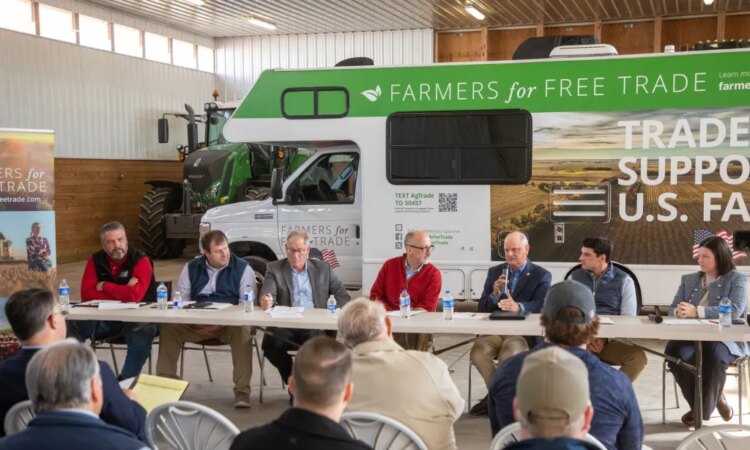
NEWTON TWP. — Trade can help small family farms and the consumers that buy their goods.
That was the message state agriculture leaders and U.S. Rep. Rob Bresnahan, R-8, Dallas Twp. conveyed Monday afternoon during a roundtable about the state of agriculture amid changing trade conditions. The discussion, which took place at Eckel Farms, explored ways farmers, agribusinesses and lawmakers can strengthen agriculture markets and support farms across the state.
The panelists agreed the rising price of commodities, combined with weather conditions, tariffs and restrictions on imports of agriculture goods from the United States to other countries, isn’t good.
They emphasized the need for lawmakers on the federal level to honor and strengthen trade deals in place with Canada and Mexico for agricultural products, and to expand trading of those products to those countries and other areas, such as Japan, the European Union and Vietnam.
“If we don’t move our products, there’s only so much availability for the demand … some of us will disappear, and it’s going to be the family farm,” said Chris Hoffman, president of the Pennsylvania Farm Bureau. “I think that we have huge opportunities by opening trade.”
Matt Espenshade, president of the Pennsylvania State Grange, said customs limitations should be eliminated to allow more agricultural exports from the U.S. into other countries.
“We want to just make sure that our products end up where they need to be used,” he said.
Monday’s roundtable was organized by Farmers for Free Trade, a nonprofit organization advocating for free trade and its benefits for farmers and ranchers, and Versant Strategies, a Harrisburg-based agriculture lobbying group. It was part of a two-month-long Motorcade for Trade listening tour, which aims to spread the word about free trade and how tariffs are impacting the agriculture industry. Monday’s roundtable was the final stop on the eight-state tour before it headed to Washington, D.C. on Tuesday.
Farmers for Free Trade Executive Director Brian Kuehl said during the tour they heard farmers are hurting from high prices, which could lead to small farms closing. He added people the organization talked to don’t want tariffs on farm imports, want to see markets expanded to export agriculture products, and the 2020 United States–Mexico–Canada Agreement on trade strengthened.
Bresnahan, who serves on the House Committee on Agriculture, agreed with Kuehl, adding domestic policy needs to be geared toward smaller farms and the visa process should be streamlined.
He touted the Local Farmers Feeding Our Communities Act, a bipartisan bill he introduced last summer that would allow states, through the U.S. Department of Agriculture, to purchase food from local farmers and producers.
He emphasized the need for guidance on trade.
“Markets don’t respond well when the goal post is constantly being moved and when you don’t have that charted path,” Bresnahan said. “It’s extremely frustrating.”
The roundtable took place after President Donald Trump announced during a trip to Asia that China has committed to buying “a tremendous amount” of American soybeans, sorghum and other farm products. Treasury Secretary Scott Bessent said China agreed to buy 25 million metric tons of soybeans annually as part of the agreement and will start by purchasing 12 million metric tons of soybeans from America between now and January.
Agriculture Secretary Brooke Rollins said China also agreed to remove its retaliatory tariffs on American agriculture products, which should open the door for sales of other crops and beef.
American farmers welcomed China’s promise to buy some of their soybeans, but they cautioned this won’t solve all their problems as they continue to deal with soaring prices for fertilizer, tractors, repair parts and seeds.
Eckel Farms owner Keith Eckel, a past president of the Pennsylvania Farm Bureau, emphasized in his opening remarks the importance of trade, adding the need for it hasn’t changed. He said after the roundtable farm families need advocates.
In addition to the panelists, others who offered remarks were state Reps. Jim Haddock, D-118, Pittston Twp., Eddie Day Pashinski, D-121, Wilkes-Barre, who chairs the state House Agriculture and Rural Affairs Committee, and Greg Hostetter, the state executive deputy secretary for the state Department of Agriculture.
The Associated Press contributed to this story










